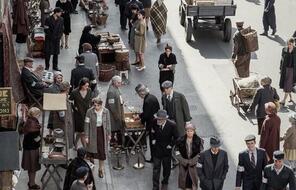“Cultural Missionaries” (Abridged)
At a Glance
Language
English — USSubject
- History
- The Holocaust
Melita Maschmann, who was then in her early 20s and held a leadership position in the BDM (the German initials of the League of German Girls), was among the first to live and work in the Warthegau.
She recalled:
My colleagues and I felt it was an honour to be allowed to help in “conquering” this area for our own nation and for German culture. We had all the arrogant enthusiasm of the “cultural missionary.". . .
How could young people, in particular, fail to enjoy such a life? It is true that if one visited the eastern parts of the Warthegau it was impossible to imagine oneself to be standing on lost German soil which had simply to be reclaimed for the Reich. This country was Polish through and through. Hitler had not reclaimed it but conquered it in battle. We knew that might had triumphed over right there. In those days we should probably have agreed that “the right of the strongest” had triumphed in the struggle for Lebensraum [living space for “Aryans”]. . . .
Our existence at that time was for us like a great adventure. . . . All through our childhood the lament over Germany’s defeat in the First World War and her misery in the postwar years had never ceased. I believe that growing up in a country where people’s minds are dominated by such a mood has a fateful effect. Young people do not want to be ashamed of their fatherland. They depend more than older people on being able to honour, admire and to love it.
The fact that we were allowed to perform a kind of “colonization work” in “advanced posts” there healed the wounds which our sense of honour had suffered in our childhood and early youth. Germany required us not merely to do a job of work but to give our entire selves. This feeling rose on many occasions to a sensation of intoxication. . . .
It goes without saying that in this situation we were inclined to romanticise our existence in the “front line,” and developed much of the colonial’s presumptuous arrogance towards the “stay at homes.". . .
I was the first Reich German B.D.M. leader to be sent to the Warthegau, and for a long time I was the only one. It is true that I had no leadership task—I had simply come to Posen to run the press department for the Regional leadership of the Hitler Youth—but I quickly made close contact with the local . . . B.D.M. leaders and was drawn into their work. 1
Connection Questions
- Melita Maschmann asks, “How could young people, in particular, fail to enjoy such a life?” Why did living and working in the Warthegau appeal to Maschmann and other young people?
- Why would Maschmann use the term “colonisation work” to describe their efforts? How is that connected to the history of imperialism (see reading, "Expansion was Everything" in Chapter 2)? How might it be connected to the term “cultural missionary”?
- Do you think that Wilhelm Hosenfeld and Herbert Mochalski experienced the same “sensation of intoxication” as Melita Maschmann? How were their responses to the troubling things they saw similar? How were they different?
- 1Melita Maschmann, Account Rendered: A Dossier on My Former Self (London: Abelard-Schuman, 1965), 73.
How to Cite This Reading
Facing History & Ourselves, "“Cultural Missionaries”," last updated March 12, 2018.








